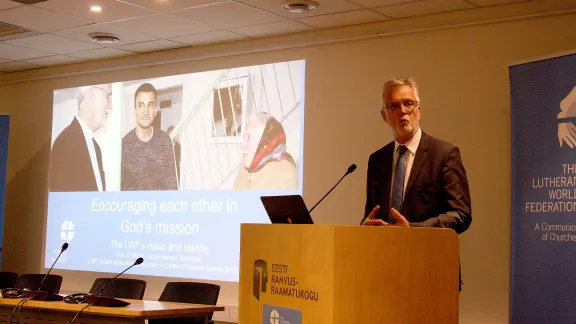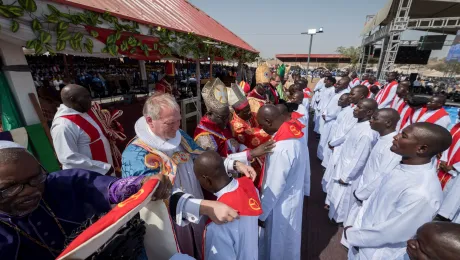
LWF General Secretary Rev. Dr Martin Junge addressing the 2019 Church Leadership Consultation for Central and Eastern Europe in Tallinn, Estonia. Photo: LWF/A. Weyermüller
LWF General Secretary addresses church leaders of Central and Eastern Europe
(LWI) - There would not be a Lutheran World Federation (LWF) without local churches, said LWF General Secretary Rev. Dr Martin Junge, addressing the 2019 Church Leadership Consultation for Central and Eastern Europe, in Tallinn, Estonia.
“The LWF is the global witness of the local churches,” Junge said. Their identities are influenced by the contexts they live in, and yet they are simultaneously called into communion relations. “Lutheran identities are polycentric – there is no central institution defining only one way of being Lutheran today.”
Lutheran identities are polycentric – there is no central institution defining only one way of being Lutheran today.
Connecting this reflection to the recent consultation on global and contemporary perspectives on Lutheranism, he added: “We are not teaching each other what it is to be Lutheran; we are sharing with each other how we understand it, and learning together as we articulate our common understanding.”
The 2019 Church Leadership Consultation for Central and Eastern Europe took place from 28 to 30 October in Tallinn, Estonia on the theme “Diversity and identity – different kinds of gifts, but the same spirit... (1 Corinthians 12, 4-6).”
Challenges facing churches
Junge underlined the role and the ministry of churches as peacebuilders in times of polarization: “We cannot lock our people into our churches, and we cannot lock reality out. People live in both the church and the world and are to be equipped to do so.”
In his presentation, he reminded the churches of the foundational pillars of the LWF – service to the neighbor, joint theological work, cooperation in mission and working for unity in the body of Christ – and how they continue to be relevant and lived out today.
He referred to tension that may result from the contextual nature of churches and their common witness as a global communion. "The church has always to be the church for its own people, speaking to their own issues and bringing the message of salvation through Christ to their own realities; yet, the church is never on its own, but always the church together with others,” Junge said.
The general secretary also addressed the question of differences in the Lutheran communion that result from both the different contexts in which churches live and the different interpretations of the Bible and diverse theological approaches. "While dealing with these differences, we should never resort to a language portraying some as having departed from scriptures, and others as not capable of reading and understanding scriptures. Everybody in the LWF reads the Bible with reverence and respect," he emphasized.
Regarding the ordained ministry, Junge reiterated that the past six Assemblies have confirmed the LWF’s commitment to the ordained ministry of men and women. “The LWF will always pursue this and work towards it,” he added.
On the way to Krakow
A special responsibility and honor for churches in Central and Eastern Europe is the Thirteenth LWF Assembly in 2023. It will take place in Krakow, hosted by the Evangelical Church of the Augsburg Confession in Poland.
Anna Wrzesińska introduced the church and its context on behalf of Bishop Jerzy Samiec. The last LWF Assembly to take place in the region was 1984 in Budapest, Hungary, and had substantially encouraged the churches behind the iron curtain. “We have enthusiastically started working towards this major gathering and are looking forward to giving a new witness of our faith after Budapest,” said Wrzesińska.


